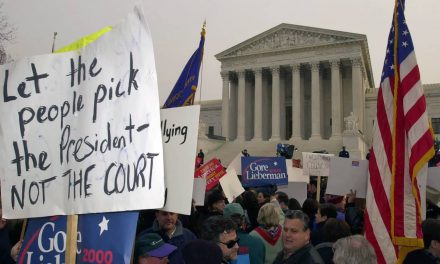
It is one of the most toxic and corrosive memes the GOP is pushing today, that is now being used to minimize the importance of universal, free, and fair elections.
Writing at the Heritage Foundation’s website in a warning about “egalitarianism,” for example, Bernard Dobski also uses the famous John Birch Society mantra as the title for his article: “America Is a Republic, Not a Democracy.”
It is a memorable slogan, and the GOP has been pushing it ever since the 1950s when Senator Joe McCarthy echoed it while recommending that Republicans only refer to the Democratic Party as:
“The ‘Democrat Party,’ with emphasis on the ‘rat.’”
After all, calling America a “republic” sounds so, well, Republican. Fox “News” follows McCarthy’s “…rat party” dictum to this day, as does almost every Republican in Congress.
But recently the stakes have changed for public acceptance of this canard, which has now gone beyond mere political party branding.
Hungary, for example, is now fully “a republic but not a democracy”: your vote doesn’t much matter in that country any more, even though they still have elections. The same is true of the republics of Kazakhstan, Russia, and Belarus, among others.
Once citizens buy into the idea that a nation is a republic but not a democracy, it’s so much easier for “strongman” leadership to justify limiting democratic processes like majority-rule voting so they can rig things so “only the right people” get to vote or have their vote counted.
Expanding on the idea, Senator Rand Paul told The Washington Post:
“The idea of democracy and majority rule really is what goes against our history and what the country stands for.”
While arguably true — from 1789 to 1965 Black people weren’t allowed to vote in the United States, and women didn’t vote until 1920 — Alexander Hamilton would nonetheless beg to differ at least with regard to “what our country stands for.”
For centuries before our Constitutional Convention, the words “democracy” and “republic” were essentially interchangable. The Founders wanted to differentiate us from the Greek “pure democracy,” though, because it failed so quickly. They wanted a “representative democracy” instead of a “pure democracy” like the failed Greek experiment.
In a 1777 letter to the man who would become one of the Constitution’s principal authors (he wrote the Preamble to our Constitution in its entirety), New York’s Gouverneur Morris, Hamilton wrote:
“[A] representative democracy, where the right of election is well secured and regulated & the exercise of the legislative, executive and judiciary authorities, is vested in select persons, chosen really and not nominally by the people, will in my opinion be most likely to be happy, regular and durable.” (Emphasis Hamilton’s)
But then comes Senator Mike Lee, tweeting to support laws that make it harder for college students, racial minorities, and Social Security-age citizens to vote:
“Democracy isn’t the objective; liberty, peace, and prospefity [sic] are. We want the human condition to flourish. Rank democracy can thwart that.”
Spoken like Viktor Orbán himself!
Republicans who believe that a democracy and a republic are incompatible with each other completely miss the fact that our 1789 American republic was the first serious, large-scale nation-state experiment with democracy within a western-world republic since the Greeks tried it almost 3000 years earlier.
Crucially, the Greeks practiced pure democracy: you served in the legislature by lottery, like we do jury duty today.
That history produced a general agreement among the Founders and the Framers of the Constitution that they didn’t want what the Greeks had. It was too unstable and, indeed, collapsed as a “pure democracy” after only 47 years (507 to 460 BCE).
As Hamilton wrote in that same letter to Morris:
“Unstable democracy is an epithet frequently in the mouths of politicians…”
Madison noted the same in Federalist 14, arguing for representative government:
“In a democracy, the people meet and exercise the government in person; in a republic, they assemble and administer it by their representatives and agents.”
But Republicans today don’t want you to know that the Founders and Framers understood that they were creating a republic that was ruled by democratic principles. It wasn’t to be Greece or Rome: it was The United States of America, a democratic republic.
They’d rather you believed that the whites-only policies of about half of those Framers, and the male-only policy of all of them, is what was intended for eternity and should be revived today via the Republican Party’s new Jim Crow 2.0 voter suppression laws.
Nelson Rockefeller, who would become Gerald Ford’s Vice President, saw this coming with the John Birch Society-pushed Goldwater sweep of the Republican Party at their 1964 convention.
“It is essential that this convention repudiate here and now,” he said over boos and chants, “any doctrinaire, militant minority, whether Communist, Ku Klux Klan, or Bircher (pause for “republic not democracy!” chants set off by his attacking the John Birch Society)…”
Rockefeller continued, taking on the crowd:
“…which would subvert this party to purposes alien to the very basic tenets which gave this party birth. Precisely one year ago today, on July 14, 1963, I warned that the Republican Party is in real danger of subversion by a radical, well-financed and highly disciplined minority. The methods of these extremist elements I have experienced at first hand.”
At that time, McCarthy’s slur against democracy and the Democratic Party was not in widespread use. Reagan’s use of that “Democrat Party” slur first peaked in 1984 when he was up for re-election; ditto for G.W. Bush, who used it most frequently in his re-election campaign in 2004.
But the damage has been done. Most Republicans now believe that democracy is a bad thing, not a benefit or even the foundation of our “democratic republican” system of government.
They think our Constitution was written to protect us against representative democracy, not to institute it in the context of a democratic republican form of government. (And, given how restricted the vote was, there’s more than a grain of truth to that — back then.)
They view Democrats, like President Biden last year asking Manchin and Sinema to “fight for democracy” (instead, they both helped Republicans kill voting rights legislation) as quaint and naïve.
But the Framers of the Constitution didn’t think that at all, at least in the broadest of terms.
Speaking to his colleagues at the Constitutional Convention on June 6th, 1787, James Madison indirectly referred to Massachusetts’ struggle to throw off the preachers who’d once taken over that state and others who’d tried to set up state-based petty aristocracies with British approval, saying:
“Was it to be supposed, that republican liberty could long exist under the abuses of it practiced in some of the States?”
Instead of limiting the protections of government to the rich or the religious, Madison argued, democracy should be as expansive as they could negotiate with the “conservative” slaveholders of that time:
“And were we not thence admonished,” he said, “to enlarge the sphere as far as the nature of the government would admit? This was the only defense against the inconveniences of democracy, consistent with the democratic form of government.”
History admonishes us today: the worldwide damage created by discarding democracy in The United States would be inestimable. Hungarian-style rigged elections would become the new worldwide norm and the new standard for what was once known as the “free world.”
Democrats, after all these years, are finally starting to push back. As Congressman Jamie Raskin recently told Republicans in the House of Representatives who insisted on referring to the “Democrat Party”:
“[W]e’re not the ‘Democrat Party’ unless they’re the ‘Banana Republican Party.’”
Words matter, as Joe McCarthy knew well. Republicans, by trashing the name of the Democratic Party, are simultaneously trashing the concept of democracy itself.
If we fail to honor democratic principles to make and keep voting safe, easy, and convenient for all Americans — the way it works in every other advanced democracy in the world — we risk the entire American experiment.
Which appears to be exactly what the Trump-aligned Republicans and neofascist media figures want.
Ilya Andriyanov
© Thom Hartmann, used with permission. Originally published on The Hartmann Report as Republicans Don’t Want You to Know America Is a Republic Ruled By Democratic Principles
Subscribe to The Hartmann Report directly and read the latest views about U.S politics and other fascinating subjects seven days a week.














